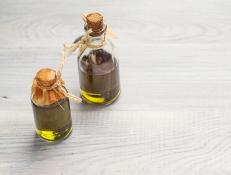What Is Collagen and Why Is It Everywhere Right Now?
Here's what you need to know about the trendy protein.

Orthosie/Getty Images
Collagen is popping up as a supplement, coffee creamer and more, but what exactly is it? This structural protein is naturally found throughout the human body (making up 80% of your skin). Thanks to the growing popularity of nutricosmetics, collagen supplements are finding their way into food and beverages. But can eating and drinking collagen really lead to health benefits like anti-aging, better skin and injury recovery? Keep reading to find out.
What Is Collagen?
Collagen is a naturally occuring protein in the human body. It's the most abundant protein in the human body, making up part of skin, bones, cartilage and other connective tissues. Collagen is is linked to cell turnover and organ protection. As we age our bodies produce less collagen, which can lead to wrinkles and weakened joint cartilage.
What Are the Benefits of Ingesting Collagen?
The purported process of eating collagen for health is all about amino acid peptides. The theory is that ingesting amino acid peptides (peptides are just short chains of amino acids) can improve your body's internal collagen production and a collagen boost could equate to benefits like less wrinkles, a more youthful glow and improved joint health. Before you order an overnight shipment of collagen, know that there is little evidence to back up the effectiveness for collagen supplements in human subjects and much more to be unpacked on this issue.
What Are Collagen Supplements?
Collagen supplements are often found in a powdered “hydrolyzed” form, which easily dissolves into foods and beverages. This powder is commonly added to teas, smoothies, coffee, yogurt and soups. Bone broth (another health craze) does contain some collagen, but supplements offer a more potent dose.
What Are Collagen Supplements Made Of?
Collagen supplements are derived from animal sources such as skins and bones of cows, pigs and scales of fish. Products are differentiated by the type of animal they are derived from and the “type” of collagen they contain. Type 1 is usually marine sourced and tied to benefits for an improved complexion as well as other skin benefits. The next most common collagen is type 3, and it is often found paired up with type 1. Derived from beef type 3 is also associated with skin and bone health. Type 2 is found in chicken (and chicken soup!) and associated with benefits for joint health and cartilage. Since vitamin C plays a vitamin role in collagen synthesis and has anti-inflammatory properties, it is also present in many collagen products.
Does It Work?
One of the biggest controversies surrounding collagen is whether or not oral ingestion can benefit the body's internal collagen levels. Up until recently there was very little data to support this was possible. While more research with human subjects is needed, a paper published in 2017 supports that oral collagen intake does allow for peptides to reach the skin.
While research is limited, the spike in popularity seems to be driving more investigation. A study published in 2018 analyzed the results of five previous studies and this meta-analysis determined that collagen supplementation can reduced the symptoms of osteoarthritis.
What Are the Risks?
Just like all dietary supplements, collagen products are poorly regulated so buyers should always beware. Check labels and looks for product verification through independent testing outfits like NSF Certified for Sport or Informed Choice. Improperly purveyed animal products risk being adulterated and contaminated and all supplements are at risk for being void of what is listed on the label.
What About Collagen Boosters?
In addition to straight up collagen ingestion there are methods and products designed to trigger increased collagen production without actually eating any collagen. Sports nutrition professionals often experiment with a combination of gelatin powder mixed with vitamin C rich juice administered before exercise to promote collagen repair in athletes recovering from injuries. A 2017 study found favorable results but more research is needed.
Bottom Line: There is still a lack of data to support the effectiveness of collagen but there is a chance taking a good quality supplement may be worth some experimentation. Just do your homework before choosing a brand.
Dana Angelo White, MS, RD, ATC, is a registered dietitian, certified athletic trainer and owner of Dana White Nutrition, which specializes in culinary and sports nutrition.
*This article was written and/or reviewed by an independent registered dietitian nutritionist.
Related Content:


































